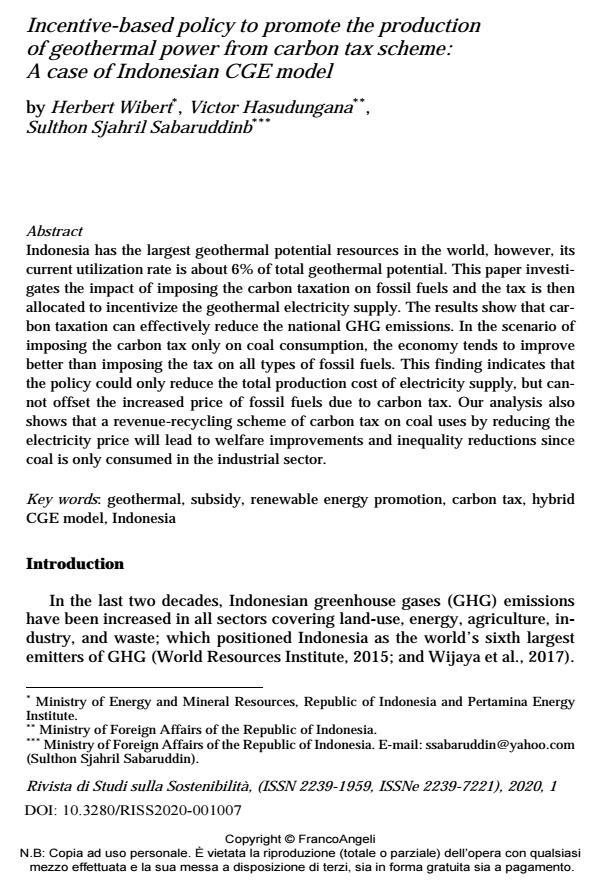Incentive-based policy to promote the production of geothermal power from carbon tax scheme: A case of Indonesian CGE model
Journal title RIVISTA DI STUDI SULLA SOSTENIBILITA'
Author/s Herbert Wibert, Victor Hasudungana, Sulthon Sjahril Sabaruddinb
Publishing Year 2020 Issue 2020/1
Language English Pages 33 P. 105-127 File size 223 KB
DOI 10.3280/RISS2020-001007
DOI is like a bar code for intellectual property: to have more infomation
click here
Below, you can see the article first page
If you want to buy this article in PDF format, you can do it, following the instructions to buy download credits

FrancoAngeli is member of Publishers International Linking Association, Inc (PILA), a not-for-profit association which run the CrossRef service enabling links to and from online scholarly content.
Indonesia has the largest geothermal potential resources in the world, however, its current utilization rate is about 6% of total geothermal potential. This paper investigates the impact of imposing the carbon taxation on fossil fuels and the tax is then allocated to incentivize the geothermal electricity supply. The results show that carbon taxation can effectively reduce the national GHG emissions. In the scenario of imposing the carbon tax only on coal consumption, the economy tends to improve better than imposing the tax on all types of fossil fuels. This finding indicates that the policy could only reduce the total production cost of electricity supply, but cannot offset the increased price of fossil fuels due to carbon tax. Our analysis also shows that a revenue-recycling scheme of carbon tax on coal uses by reducing the electricity price will lead to welfare improvements and inequality reductions since coal is only consumed in the industrial sector.
Keywords: Geothermal, subsidy, renewable energy promotion, carbon tax, hybrid CGE model, Indonesia
- Meeting investors’ demands in PPP project to improve enthusiasm for participating in green and low-carbon Jiaqi Liu, Peifen He, Qiuling Meng, in Economic Research-Ekonomska Istraživanja 2167224/2023
DOI: 10.1080/1331677X.2023.2167224 - Evaluative Study on the Impact of Carbon Tax Implementation in Promoting Environmentally Friendly Industries in Indonesia Rahmat Salam, in Journal of Hunan University Natural Sciences /2026
DOI: 10.55463/issn.1674-2974.52.12.7 - Navigating Carbon Pricing: The Economic and Strategic Implications for Industrial Enterprises Damith Gangodawilage, in Sinergi International Journal of Accounting and Taxation /2024 pp.44
DOI: 10.61194/ijat.v2i2.489 - System dynamics modeling of leveraging geothermal potential in Indonesia towards emission reduction effort: A case study in Indonesia state-owned energy enterprise Dhamar Yudho Aji, Utomo Sarjono Putro, in Renewable Energy Focus 100612/2024 pp.100612
DOI: 10.1016/j.ref.2024.100612
Herbert Wibert, Victor Hasudungana, Sulthon Sjahril Sabaruddinb, Incentive-based policy to promote the production of geothermal power from carbon tax scheme: A case of Indonesian CGE model in "RIVISTA DI STUDI SULLA SOSTENIBILITA'" 1/2020, pp 105-127, DOI: 10.3280/RISS2020-001007